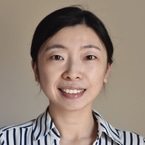
Abstract 5268: The spectrum of FGFR mutations in pediatric and young adult solid tumor.
What are your long-term goals?
I love the field of molecular cancer testing and sincerely believe this is a great help to cancer diagnosis and treatment. I plan to pursue my career in molecular cancer testing and accomplish the Laboratory Genetics and Genomics (LGG) fellowship program for additional training before becoming a laboratory director. As a clinical scientist working with excellent laboratory directors, I see their contribution to patient diagnosis, treatment, and cancer predisposition surveillance. I wish I could be one of them and make my own contribution with all these years of training and experience.
Please share information about how the pandemic has impacted your research over the last two years.
When COVID started two years ago, we immediately shifted from an onsite to a remote working model. As a “dry bench” scientist, I cannot say enough how much I appreciate our wet bench team’s commitment and highly skilled techniques. We noticed during the pandemic that cancer diagnosis and treatment would never stop because of a pandemic. Our case volume was increased, and we are still on the same short turn-around time to provide our clinicians with all the answers we could get. It’s never an easy feeling to complete a tumor sample analysis, but knowing we never slow down in fighting for our patients keeps me motivated every day during COVID.